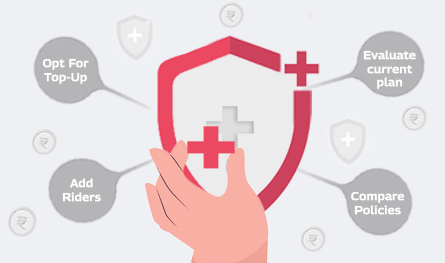Related Articles
 Jan 08, 2025
Jan 08, 2025
Is Varicose Vein surgery covered under the health insurance policy in India
 Health Insurance
Health Insurance

Taking control of your health means more than just reacting to illness; it means proactively safeguarding your well-being. With the escalating costs of medical care, a comprehensive health insurance policy is no longer optional—it's vital.

If your current plan leaves you feeling vulnerable or fails to address your evolving needs, it's time to reassess. Upgrading your coverage is about empowering yourself to manage your health confidently, knowing you have the resources to access the best possible care.
Before we discuss the how, let’s talk about the why. Upgrading your health insurance plan is about ensuring you’re adequately protected against unforeseen medical expenses. Here are a few reasons why upgrading might be a smart move:
Upgrading your health insurance policy doesn’t have to be complicated. Here are some practical steps to ensure you get the best coverage:
Start by reviewing your existing policy. What’s covered? What’s not? Are there any gaps in coverage? For instance, does your plan include critical illness coverage or maternity benefits? Understanding your current policy will help you identify what needs improvement.
Your health insurance plan should align with your lifestyle and medical requirements. For instance, if you’re planning to start a family, look for policies that offer maternity and newborn cover. If you travel frequently, consider a plan with global coverage.
Don’t settle for the first upgrade you come across. Use online comparison tools to evaluate different health insurance plans. Look at factors like sum insured, premium costs, network hospitals, and claim settlement ratios.
Consider a top-up or super top-up plan if you’re happy with your current policy but need additional coverage. These plans kick in after you’ve exhausted your base sum insured, providing extra financial protection. Plus, they’re often more affordable than buying a completely new policy.
Riders can be attached to your existing health insurance policy for extra benefits as add-ons. Common riders include critical illness cover, accidental hospitalisation, and daily cash allowance. These can be a cost-effective way to enhance your coverage without switching plans.
If your current policy is too limited, it might be time to switch to a more comprehensive health insurance plan. Look for policies that offer features like lifetime renewability, no-claim bonuses, and coverage for pre- and post-hospitalisation expenses.
When upgrading your health insurance policy, keep an eye out for these essential features:
Upgrading your health insurance plan is a big decision, and it’s easy to make mistakes. Here are a few pitfalls to avoid:
Technology has made upgrading your health insurance policy easier than ever. Many insurers now offer online portals and mobile apps where you can compare plans, calculate premiums, and even purchase policies in minutes. Tools like AI-powered chatbots can help you understand complex terms and conditions, making the process more user-friendly.
Evaluate your current plan, assess healthcare needs, compare policies, consider top-up options, and look for comprehensive plans.
Look for a higher sum insured, cashless hospitalisation, pre-existing disease coverage, no-claim bonuses, and wellness benefits.
Avoid ignoring policy fine print, choosing based only on premiums, overlooking network hospitals, and misrepresenting medical history.
Technology has made it easier with online comparisons, mobile apps, and AI chatbots that help you choose and understand policies quickly.

Paybima Team
Paybima is an Indian insurance aggregator on a mission to make insurance simple for people. Paybima is the Digital arm of the already established and trusted Mahindra Insurance Brokers Ltd., a reputed name in the insurance broking industry with 17 years of experience. Paybima promises you the easy-to-access online platform to buy insurance policies, and also extend their unrelented assistance with all your policy related queries and services.
.png)
Bringing home a new vehicle is a matter of great joy and excitement for the whole family. But this joy comes with the trouble of undergoing various procedures to get the vehicle registration done by the authorities. You can put yourself in legal trouble by driving your new vehicle without the RC or the Registration Certificate.

.png)
Wondering about what is Taxi insurance ? It is a highly specific type of insurance that offers coverage for owners of taxis, who are an indispensable part of our public transportation ecosystem throughout the country. Here’s learning more about the same.

.png)
Green Tax is a measure taken by the government to make people conscious about the environment and to work for its sustainability in the future. Let us learn more about the green tax on vehicles in this post.

.png)
We know that a driving license (DL) is a mandatory requirement for driving a vehicle in India. Also, we know that driving a motor vehicle without a DL is a punishable offense. This shows the importance of a driving license. Hence, misplacing or losing such an important document can cause great hassle to the license holder. But losing it or misplacing can happen to anyone. So, what can be done if you lose your DL or if you misplace it somewhere? The answer is – you can apply for a duplicate DL.

.png)
The true purpose of having a comprehensive motor insurance policy is felt without a doubt when your vehicle suffers damages and you make a motor insurance claim. When the insurance company pays the cost of repairs which, otherwise, had been your headache, you feel a sense of calm and relief. But your calm and relief is short-lived when the repair costs are not paid in full. The insurance company makes some deductions in the total repair bills and then the claim is settled. Have you wondered why such deductions are made?
